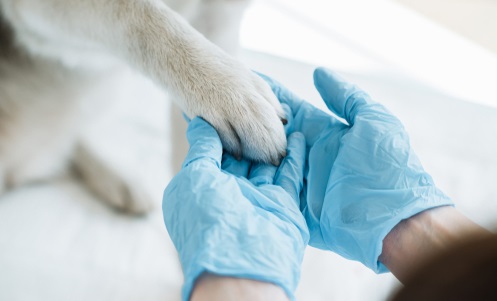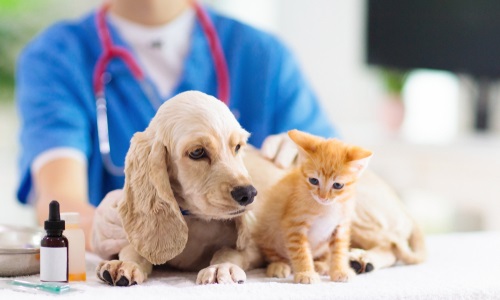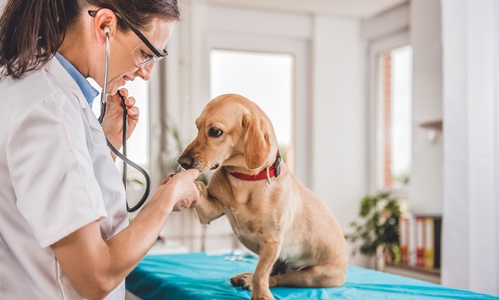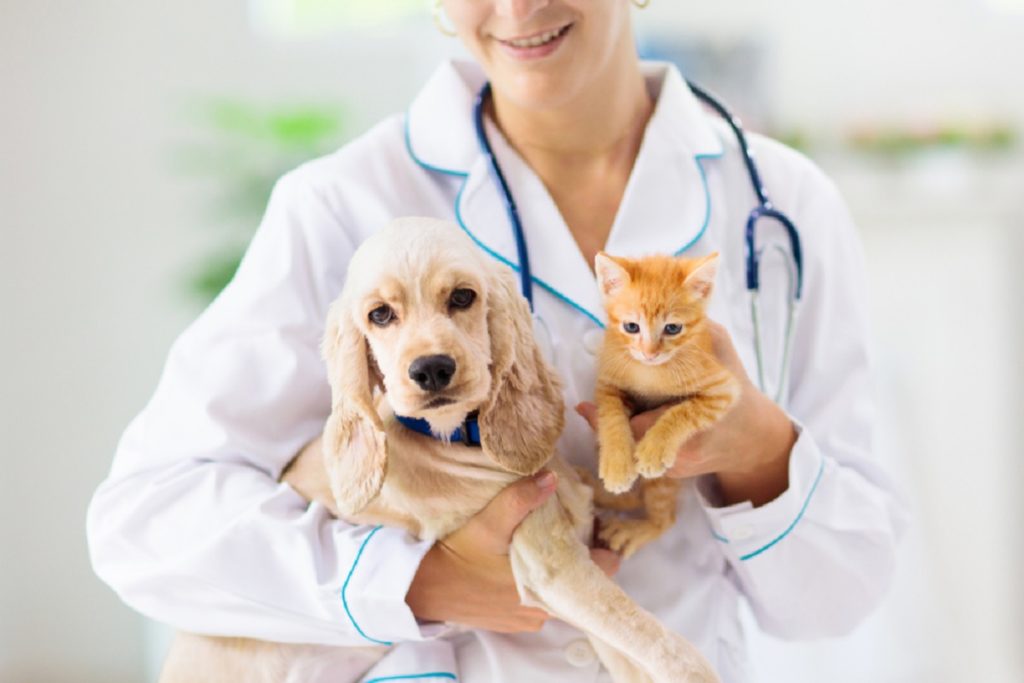In light of the COVID-19 pandemic, many pet owners around the world have been wondering, “are vets open during shelter in place?” Due to the constantly changing protocols enforced across the United States, federal, state and local procedures continue to evolve in response to the novel coronavirus pandemic. While it is important to be mindful of our pets’ health and safety, it can be confusing during a pandemic as far as knowing what to do in case of a medical emergency. For those seeking answers regarding vet clinic availability during the coronavirus outbreak, read on for helpful COVID-19 information and tips.
COVID-19 & Your Pet: Are Animal Clinics Open?
According to the Humane Society COVID-19 FAQ page, “The Humane Society Veterinary Medical Association has worked with our state directors to ensure that veterinary services and other animal care needs are identified as essential businesses (during the shelter-in-place order). HSVMA is also helping veterinarians adapt to telemedicine and ensuring that providers are able to offer those services.”
“If necessary, we will work with state governments to encourage authorities to define veterinary services, animal control and access to pet food and supplies as essential services that must remain open if additional business closures are ordered.”
The Humane Society also explained what is being done at the state level:
“Our state directors all across the country are asking emergency managers and other officials to ensure that critical animal needs, such as the care of animals in various settings and the ability for animal care personnel to perform their duties, are addressed in emergency orders.” In order to learn the latest news with regard to pet/human COVID-19 facts, the Humane Society urges pet owners to check their FAQ page often, go online via ‘find your state’ for additional resources, and check out regional Humane Society Facebook pages (by state and/or county) for updates and community resources.
In short, it’s important to be informed of your local vet’s office policies, as they may vary by state, region, city, county and so on. Before your pet is faced with a medical emergency, remain proactive – be sure to call first and see what protocols are in place so you know how to proceed in the event that your pet needs care. For example, some offices may have changed their hours; in other cases, they may have limited staff available. If you have an appointment, call ahead to ensure you are following the necessary procedures for the sake of everyone’s safety, including you and your pet, as well as the animal hospital staff. It’s also important to note that most veterinary offices aren’t performing elective procedures, so unless it’s an emergency, your vet may ask you to reschedule non-emergency operations or procedures at a later date. In general, hours and policies will vary between individual practices, so be sure to call ahead and check websites if possible for updates to your regular vet’s office.

In some instances, you might be able to arrange a telemedicine appointment with your vet’s office, or figure out another mode of virtual communication from home – ask the front desk or contact the office online to schedule a virtual appointment if necessary. This not only minimizes unnecessary trips out of your home, but reduces face-to-face contact, allowing you to maintain social distancing for the safety of your pet, your household and your vet’s practice.
Below are some frequently-asked questions regarding pet care and COVID-19:
Q: Can my cat/dog get coronavirus?
A: At this time, the CDC and the World Organisation for Animal Health have issued statements explaining there is no current evidence that indicates pets can spread the COVID-19 virus to humans. That means, your canine is safe from coronavirus. Furthermore, the WSAVA (World Small Animal Veterinary Association) Global Veterinary Community also advised that current studies strongly indicate COVID-19 cannot be contracted from pets. However, WSAVA cautions that there is still much to be learned, and updates will be provided as new information becomes available.
Q: Should I get my dog / cat tested for COVID-19?
A: On April 22nd, 2020, the CDC reported that the first confirmed cases of COVID-19 infection in two pet cats in two separate areas of New York State. While this is not the norm, it has raised concern among pet owners across the nation. In some rare instances, pets may become infected with COVID-19; however, the chances of them getting sick or infected with coronavirus – or passing it onto a person or another animal – is highly unlikely.
As reported by The Associated Press, widespread testing in animals isn’t recommended by the USDA. However, veterinarians may recommend testing for pets who’ve been exposed to someone with coronavirus.
A recent article featured on USA Today offered caution to pet owners, with an excerpt from Dr. Casey Barton Behravesh, a CDC official who works on human-animal connections: “”We don’t want people to panic. We don’t want people to be afraid of pets” or to rush to test them en masse. There’s no evidence that pets are playing a role in spreading this disease to people.” The article went on to quote the CDC, who recommended, “Treat pets as you would other human family members.” In summary, practice social distancing with pets, too – avoid any and all interaction with other people and animals outside the home, keep cats indoors at all times (even if they are ‘outdoor’ cats), avoid dog parks at all costs, and keep dogs on a leash at all times, maintaining a 6–8 feet distance from other humans and animals during walks.
Another important item to consider: although there may be additional animals who test positive as infections continue in humans, people should be aware that such animal testing does not reduce the availability of COVID-19 tests for humans. As in any situation, if you notice your pet is showing signs of severe illness, contact your vet immediately for next steps.
Q: What if I’m sick with COVID – can my pet spread it to other people?
A: With fear, uncertainty and a lack of information available, many pet owners are confused as to whether or not companion animals are capable of spreading the novel coronavirus. However, Dr. Wesley Bissett, VET Director, Veterinary Medicine & Biomedical Sciences Texas A&M University explained, “At this point, what we know right now is that animals are not involved in the disease transmission cycle as something that can support viral infection and replication, but what you do have to worry about is what virus may be on their coat.” He then went on to outline the solution – bathing pets who may have been exposed to the virus. The doctor emphasized the need to take basic precautions, such as wearing gloves, protective clothing to avoid direct contact with the animal, and even keeping water pressure low so as to not splash around and potentially spread the virus. He concluded, “But after that, again, from everything we know right now, that animal is safe. It’s not going to contribute to the disease. So, if you’re concerned about that, arrange for that type of bath to take place and then that animal should be safe in the event that you need to have one of your loved ones provide the care that it needs, so you don’t have to worry about that while you’re recovering from illness.”

The NYC Mayor’s Office of Animal Welfare also offers a helpful guideline for pet owners; although New York State is one of the hardest-hit in the nation, the outline is useful to anyone no matter where they live. Visit nyc.gov for a downloadable guide and additional information. Below, the plan as seen on the site:
Make a Plan — Prepare for a Human Health Emergency:
- Designate a trusted pet caregiver (family, friend, neighbor, colleague). Your identified caregiver should have a set of your house keys, be familiar with your home and pet, know your emergency plan, and have your contact information.
- Record important information about your pet so you can easily access it during an emergency.
- Put together a Go Bag for each pet with basic food, supplies, medicine, identification, a list of emergency contacts, your veterinarian’s contact information, and proof of vaccination.
- Keep a collar/harness, leash, and your animal’s Go Bag in a place where it can be easily found. Have crates, food, extra litter, and other supplies on hand for quick movement of pets.
- If you have neighbors who need help, offer to foster or walk their dog.
- Update animal vaccines (Rabies, Bordetella) in the event boarding becomes necessary.
- If your pet is on medication, ask your veterinarian for an extra supply.
- Ensure all medications are documented with dosages and administering instructions.
- If you do not have a yard, be sure to have extra cleaning products and newspaper or puppy pads on hand if you cannot leave your home to walk your dog.
Ensure Proper Identification:
- Dogs and cats should wear a collar or harness, rabies tag, and identification tag at all times. Identification tags should include your name, address, and phone number, and the phone number of an emergency contact.
- Make sure your pet’s microchip is registered and up to date.

Veterinary Care:
Emergency veterinary care is an essential service. However, many veterinary clinics and hospitals are adjusting their practices to reflect social distancing guidance related to COVID-19. If your pet needs care, first call your veterinarian to determine how to proceed.
Sources Cited:
1) “Coronavirus (COVID-19) FAQ.” The Humane Society Of The United States (humanesociety.org), (no publish date), https://www.humanesociety.org/resources/coronavirus-covid-19-faq#get. Accessed April 23, 2020.
2) “What You Can and Cannot Do During a Stay-at-Home or Shelter-in-Place Order.” 5 Chicago / nbcchicago.com, March 20, 2020, https://www.nbcchicago.com/news/local/what-you-can-and-cannot-do-during-a-stay-at-home-or-shelter-in-place-order/2241024/. Accessed April 23, 2020.
3) Shannon, Joel. “2 cats test positive for coronavirus; officials recommend precautions for pets.” USA Today (usatoday.com), April 22, 2020, https://www.usatoday.com/story/news/nation/2020/04/22/2-cats-test-positive-coronavirus-new-york-first-us-pets/3006433001/. Accessed April 23, 2020.
4) Bloom, Aubrey; Texas A&M University College of Veterinary Medicine & Biomedical Sciences. “FAQs As Vet Med Teaching Hospital Continues Operation During Shelter-In-Place.” Texas A&M Today (today.tamu.edu), April 2, 2020, https://today.tamu.edu/2020/04/02/faqs-as-vet-med-teaching-hospital-continues-operation-during-shelter-in-place/. Accessed April 23, 2020.




